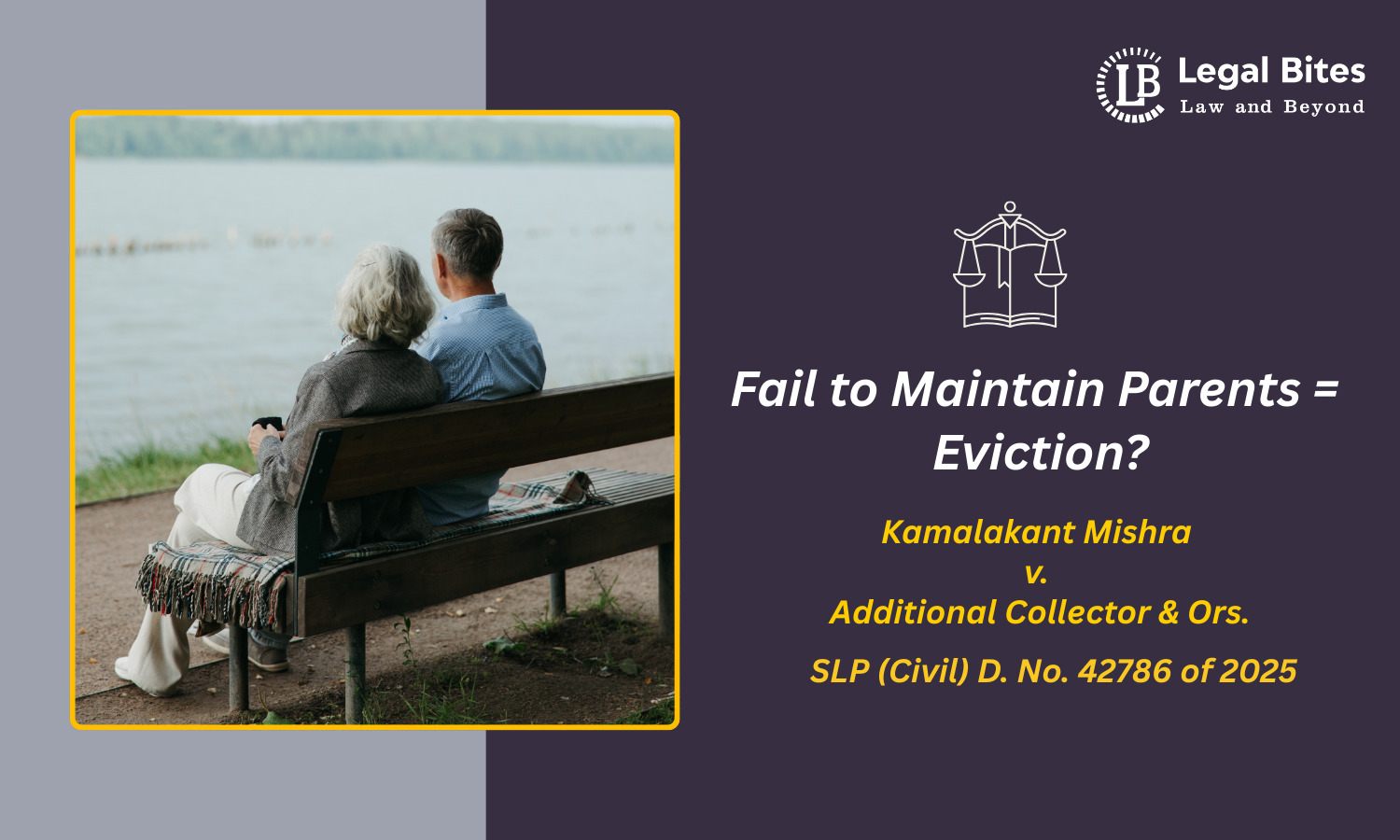
The relationship between parents and children carries not just emotional and moral obligations but also legal responsibilities. As parents grow older, the duty to maintain them shifts significantly towards their children. Recognising the growing neglect of senior citizens, the Indian legislature enacted the Maintenance and Welfare of Parents and Senior Citizens Act, 2007 (“the Act”), a welfare legislation aimed at ensuring the dignity and protection of elders.
A recurring question under this Act is: Can senior citizens evict their children from property if they fail to fulfil their maintenance duties?
The Supreme Court in Kamalakant Mishra v. Additional Collector & Ors. (2025) recently answered this question with clarity, reinforcing the rights of senior citizens against neglectful children.
Statutory Framework
The Act provides a strong legal framework for elderly parents to claim maintenance and protection:
- Section 22 empowers authorities to protect the life and property of senior citizens.
- Section 23 allows the cancellation of the transfer of property if children fail to provide for their parents.
- Section 24 criminalises the abandonment of parents.
Most importantly, Maintenance Tribunals have been given the authority to order the eviction of children or relatives occupying the senior citizen’s property in violation of their duty to maintain.
Facts of the Case
- The appellant, an 80-year-old father, owned two properties in Mumbai.
- His eldest son (Respondent No. 3), though financially sound, took possession of these properties and denied residence to his parents.
- In 2023, the parents filed an application before the Tribunal under Sections 22, 23, and 24 of the Act seeking maintenance and eviction.
- The Tribunal ordered eviction and directed the son to pay ₹3,000 monthly maintenance.
- The Appellate Tribunal upheld this order.
- However, the Bombay High Court set aside the eviction, holding that since the son had crossed 60 years by 2024, he too was a senior citizen, and thus, eviction could not be ordered.
- The matter reached the Supreme Court.
Supreme Court’s Ruling
The Court allowed the appeal and restored the Tribunal’s eviction order.
Key Findings:
Relevant Age for Consideration
- The High Court wrongly considered the son’s age at the time of the appeal. The Supreme Court clarified that the relevant date is when the application was filed (2023), when the son was 59 years old—hence not a senior citizen under the Act.
Purpose of the Act
- The Act is a welfare legislation. It must be interpreted liberally to serve its beneficent object—ensuring protection of elders from neglect and exploitation.
Power to Evict
- Citing S. Vanitha v. Deputy Commissioner Bengaluru Urban District (2021) 15 SCC 730, the Court reiterated that Tribunals are empowered to order the eviction of children/relatives who fail to maintain senior citizens or obstruct their right to residence.
Breach of Obligation
- The son, despite being financially stable, refused residence to his parents and breached his statutory obligation to maintain them. Such conduct justifies eviction.
Relief Granted
- High Court’s order was set aside.
- Son was directed to vacate the property.
He was given two weeks to submit an undertaking to vacate by 30 November 2025, failing which the eviction could be enforced immediately.
Legal Significance
This judgment clarifies several crucial aspects:
- Right of Parents over Property: Ownership and right to residence cannot be usurped by children under the guise of possession.
- Tribunal’s Authority: Maintenance Tribunals have the jurisdiction not only to order monetary maintenance but also to direct eviction of children if necessary to protect parents.
- Children’s Duties: Financial independence of children does not absolve them of their statutory duty. Failure attracts both civil consequences (eviction, maintenance) and potential criminal liability under Section 24.
- Erroneous Grounds: Courts must not extend protection to neglectful children by misinterpreting the age or status under the Act.
Key Highlights of the Decision
Justice Vikram Nath and Justice Sandeep Mehta stated:
The framework of the Act clearly notes that the law was enacted to address the plight of older persons, for their care and protection. Being a welfare legislation, its provisions must be construed liberally so as to advance its beneficent purpose. This Court on several occasions has observed that the Tribunal is well within its powers to order eviction of a child or a relative from the property of a senior citizen, when there is a breach of the obligation to maintain the senior citizen.
In the present case, despite being financially stable, the respondent has acted in breach of his statutory obligations in not allowing the appellant to reside in the properties owned by him, thereby frustrating the very object of the Act. High Court fell in error in allowing the writ petition on a completely untenable ground.
Practical Implications
- Senior Citizens’ Protection: Elders can confidently approach Maintenance Tribunals if neglected or harassed by children. The law empowers them to reclaim not just financial support but also the peaceful enjoyment of their property.
- Children’s Responsibility: The ruling sends a strong message—failure to fulfil maintenance duties can lead to legal eviction from parental property.
- Policy Enforcement: With rising cases of elder abuse, the judgment strengthens the implementation of the Act, ensuring its welfare objectives are not diluted by narrow interpretations.
Conclusion
The Supreme Court has reaffirmed that senior citizens are entitled to live with dignity, free from exploitation and neglect by their children. The law permits parents to evict children from their property if they fail to maintain them or obstruct their rights.
This judgment thus strikes a balance—upholding traditional family obligations while ensuring that statutory protections for elders are enforced effectively. It is a clear reminder that filial duties are not optional but enforceable legal obligations.
Important Link
Law Library: Notes and Study Material for LLB, LLM, Judiciary, and Entrance Exams